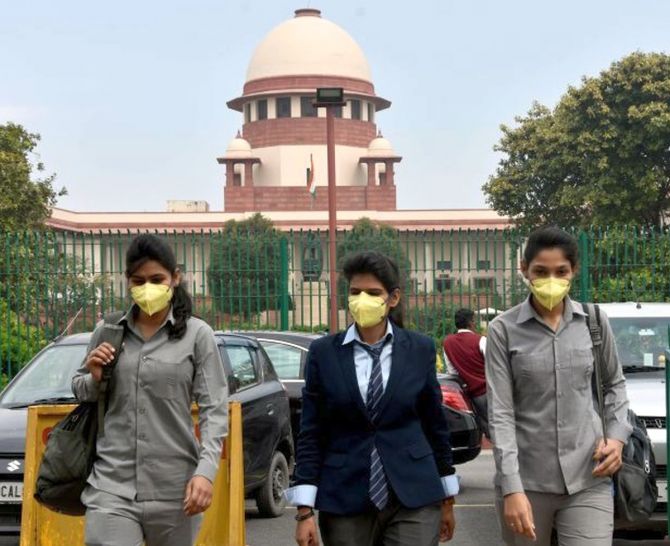As the coronavirus pandemic made courts adopt the new normal and go virtual in 2020, the Union law ministry pitched in by providing the required infrastructure to ensure online hearings are held smoothly.

As part of its push to improve India's ranking in the ease of doing business, the ministry also brought in an ordinance to amend the arbitration law.
Issued in November, the ordinance ensures that all stakeholder parties get an opportunity to seek an unconditional stay on enforcement of arbitral awards where the arbitration agreement or contract is 'induced by fraud or corruption'.
The ordinance which further amends the Arbitration and Conciliation Act, 1996 also does away with the 8th Schedule of the Act which contained the necessary qualifications for accreditation of arbitrators.
This provision had faced criticism from some quarters that the conditions prescribed in the law came in way of India getting the benefit of having foreign arbitrators.
"But that was not the case and a wrong impression had got created. Still, to do away with that impression, the concerned schedule has been dropped," a government functionary explained.
Now, the qualifications based on which arbitrators will be accredited will be prescribed by regulations, which will be framed by a proposed arbitration council.
Till recently, an arbitration award was enforceable even if an appeal was filed against it in the court under Section 36 of the law. But the court could grant a stay on the award on conditions as it deemed fit.
As per the latest amendment brought through the ordinance, if the award is being given on the basis of an agreement based on fraud or corruption, then the court will not impose a condition to stay the award and grant an unconditional stay during the pendency of the appeal if it has been challenged under Section 34 of the arbitration law.
The law ministry ordinance said the amendment was necessary 'to address the concerns raised by stakeholders after the enactment of the Arbitration and Conciliation (Amendment) Act, 2019 and to ensure that all the stakeholder parties get an opportunity to seek an unconditional stay of enforcement of arbitral awards where the underlying arbitration agreement or contract or making of the arbitral award are induced by fraud or corruption'.
In February, the Union Cabinet approved the constitution of the 22nd Law Commission which advises the government on complex legal issues. The term of the previous law panel had ended on August 31, 2018.
But the law ministry is yet to notify the new panel, which will have a term of three years.
The panel will have a full-time chairperson, four full-time members (including a member secretary), and law and legislative secretaries.
Seeking to boost the capability of the lower judiciary to hear cases online, funds have been released to set up 'video conference cabins' in 2,506 court complexes across India.
While funds to the tune of Rs 5.21 crore were released in September to set up video conference cabins, another Rs 28.886 crore were given in October to buy additional video conference equipment, including hardware, cables and monitors.
The funds were provided by the e-committee of the Supreme Court and the Department of Justice in the law ministry.
While India has 3,288 court complexes, which house thousands of subordinate courts, the funds have been released for 2,506 court complexes to set up video conference cabins.
Bigger court complexes with a large number of courtrooms would get multiple cabins as compared to smaller complexes.
The size of a court complex, including the number of courts it houses, depends upon the size or population of the state.
As courts continue to hear cases online amid the COVID-19 pandemic, the government has also procured 1,500 additional video conferencing licences at an approximate cost of Rs 9 crore for providing the facility for high courts and district courts.
While the procurement has been completed, the process of installation is on.
Such licences are required for legal and extended use of the video conference facility software.
From the day the nationwide lockdown was imposed to check the spread of coronavirus till October 28, high courts and district courts across India have heard over 49.67 lakh cases virtually, according to data collated by the law ministry.
The Centre had imposed the lockdown from March 25 to prevent the spread of the novel coronavirus.
From June 8, it started gradually relaxing restrictions under 'Unlock'.
This year, the law ministry also asked states to set up special courts to settle disputes related to infrastructure project contracts under a law which was amended two years ago, saying it is very important in improving the 'Ease of Doing Business' ranking of both India and states.
Citing the examples of the high courts of Allahabad, Karnataka and Madhya Pradesh, it has suggested other high courts to allocate a special day to make already functioning designated special courts for dealing with infrastructure project litigation as dedicated courts.
Section 20B of the Specific Relief (Amendment) Act, 2018, provides for designated courts.
But the law ministry wants a designated court to function as a dedicated court on special days.
In a letter to the registrars general of all high courts last week, the secretary (Justice) in the law ministry said that the Karnataka, Allahabad and Madhya Pradesh high courts have set up designated special courts instead of dedicated special courts under the Specific Relief Act.
The high courts have dedicated special days every week to enable exclusive handling of specific relief matters pertaining to infrastructure project contracts.
'This arrangement could be considered for adoption in your high court as an alternative measure until dedicated special courts are set up.
'This could be helpful in the enforceability of contract both from the perspective of time and cost, thereby stimulating investors' confidence and creating conducive business climate,' the letter said.
In October, Law Minister Ravi Shankar Prasad had written to all chief ministers pressing for special courts under the Specific Relief (Amendment) Act, 2018.











 © 2025
© 2025